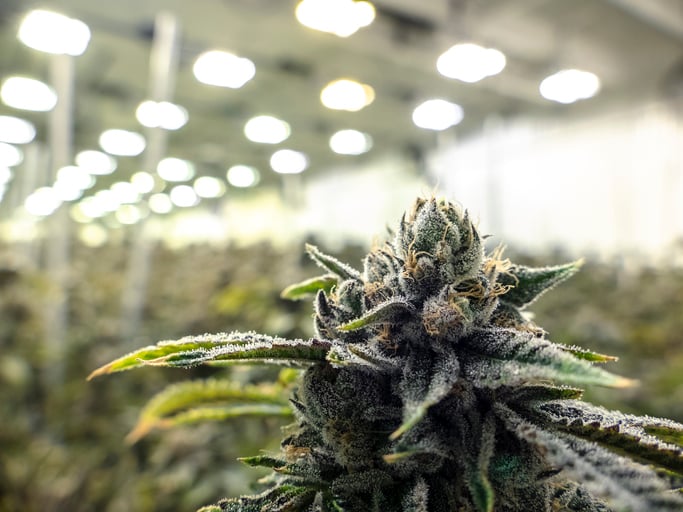You might consider buying Canopy Growth (CGC +2.03%) stock for several reasons. Perhaps you think Canopy's relationship with Constellation Brands positions it as a likely winner in the global marijuana industry. Maybe you like Canopy's expansion into the U.S. hemp market.
But there's one thing that probably wouldn't enter your mind at all when contemplating buying shares of Canopy Growth -- its high dividend yield. There's a good reason why that's the case: Canopy Growth doesn't pay a dividend.
However, you might want to factor high dividend yields into the possible value proposition for Canopy Growth. Sound absurd? The idea isn't nearly as crazy as you might think.

Image source: Getty Images.
The REIT stuff
Canopy Growth co-CEO Bruce Linton is exploring ways to monetize its property assets, according to Bloomberg's Kristine Owram. Linton said in a phone interview that Canopy is mulling through several options, including issuing bonds and mortgaging the properties.
The most intriguing alternative identified by Linton is for Canopy Growth to spin off its properties into a real estate investment trust (REIT). If Canopy chose to go the REIT route, current shareholders could find themselves owning a high-yield dividend stock.
Canadian and U.S. laws governing REITs differ in some ways, but REITs are still pretty similar in both countries. REITs, as their name indicates, own real estate. They make money by leasing real estate properties to customers. And a high percentage of their taxable income must be distributed to shareholders to qualify for special tax treatment.
What would happen if Canopy Growth spun off its properties into an REIT? The REIT would be a completely separate entity from Canopy Growth and probably traded publicly in Canada and perhaps the U.S. as well. Investors who bought shares of the REIT would in effect be partially buying Canopy Growth's current properties -- its land and its buildings. Because the REIT would be spun off from Canopy Growth, though, Canopy's shareholders would likely receive shares in the REIT.
The benefit for Canopy Growth is that it would receive cash for its properties. Bruce Linton told Bloomberg that he'd "like to use that money to build in five more countries rather than look at it and go, 'Yep, that's all ours, we own it.'" The REIT would have a built-in long-term tenant making lease payments -- Canopy Growth. As for Canopy Growth investors, they would own stock of a company with more money to invest in expansion as well as shares of a new entity, the REIT, that would probably pay out a nice juicy dividend.
Check out the latest Canopy Growth earnings call transcript.
Plenty of precedents
Canopy Growth wouldn't be the first cannabis-focused REIT if it decides to move forward with Linton's idea. Innovative Industrial Properties (IIPR 3.15%) owns properties in 10 U.S. states. It leases these properties to businesses operating in the medical cannabis industry.
Innovative Industrial Properties' dividend yield of 2.14% isn't bad, but it probably wouldn't meet most investors' definition of a high yield. However, the problem isn't the REIT's dividend payout. Innovative Industrial Properties' yield isn't as high as it would otherwise be because the stock price has nearly tripled over the last 12 months.
But Innovative Industrial Properties started out as an REIT. While there aren't examples of marijuana producers spinning off REITs, there are precedents in other industries such as healthcare and retail.
One of the most successful REIT spinoffs was done by Darden Restaurants, which operates several well-known restaurant chains including Olive Garden and Longhorn Steakhouse. In 2015, the company spun off some of its properties into a publicly traded REIT, Four Corners Property Trust. Darden shareholders at the time received one share of the new REIT for every three shares of Darden that they owned.
There was some skepticism about the move initially. However, Four Corners Property Trust now pays out a dividend yielding 4.1%, and Darden's share price has more than doubled since the spinoff.
A high-yield dividend stock?
Will Canopy Growth itself become a high-yield dividend stock? It's not likely it will happen anytime soon.
As Bruce Linton indicated in the Bloomberg interview, Canopy's focus is on expanding internationally. The company will want to reinvest every penny it can into growing its business. Dividends aren't on the table and probably won't be a serious alternative for years, if ever.
However, the idea of spinning off its properties into an REIT makes sense in several ways for Canopy Growth. While such a move wouldn't turn Canopy Growth into a high-yield dividend stock, it could set up current Canopy shareholders to own shares of a new entity that could very well pay a strong dividend. And that just might happen in the near future.







